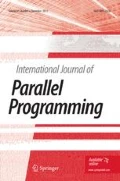Abstract
Piranha is a execution model for Linda4 developed at Yale(1) to reclaim idle cycles from networked workstations for use in executing parallel programs. Piranha has proven to be an effective system for harnessing large amounts of computing power. Most Piranha research to this point has concentrated on efficiently executing a single application at a time. In this paper we evaluate strategies for scheduling multiple Piranha applications. We examine methods for predicting idle periods and the effectiveness of scheduling strategies that make use of these predictions. We present a prototype scheduler for the Piranha system implemented using the process trellis software architecture for networks of workstations.
Similar content being viewed by others
References
David Gelernter and David Kaminsky, Supercomputing out of recycled garbage: Preliminary experience with Piranha. Technical Report YALEU/DCS/RR-883, Yale University Department of Computer Science (December 1991).
Marc Jourdenais, Extending the process trellis software architecture to distributed environments. Yale CS690/691 Research Project Report (May 1993).
Carl A. Waldspurgeret al., Spawn: A distributed computational economy.IEEE Transactions on Software Engineering, 18 (2) (February 1992).
B. A. Huberman (ed.),The Ecology of Computation, North-Holland, Amsterdam, 1988.
Abraham Silbershatz and James L. Peterson,Operating System Concepts, Addison-Wesley, alternate edition, 1988.
Michael E. Factor, The Process Trellis Software Architecture for Parallel, Real-Time Monitors. Ph.D. thesis, Yale University, December 1990.
Nichoals J. Carriero, Eric Freeman, and David H. Gelernter, Adaptive parallelism on multiprocessors: Preliminary experience with Piranha on the CM-5. In Utpal Banerjee, David Gelernter, Alex Nicolau, and David Padua (ed.),Languages and Compilers for Parallel Computing, inLecture Notes in Computer Science, Springer Verlag, Berlin,768: 139–151 (1994).
Author information
Authors and Affiliations
Additional information
This work was supported by AASERT Grant F49620-92-J-0240. AFOSR-91-0098 and NASA Training Grant NGT-50719.
Rights and permissions
About this article
Cite this article
Carriero, N., Gelernter, D., Jourdenais, M. et al. Piranha scheduling: Strategies and their implementation. Int J Parallel Prog 23, 5–33 (1995). https://doi.org/10.1007/BF02577782
Received:
Revised:
Issue Date:
DOI: https://doi.org/10.1007/BF02577782




